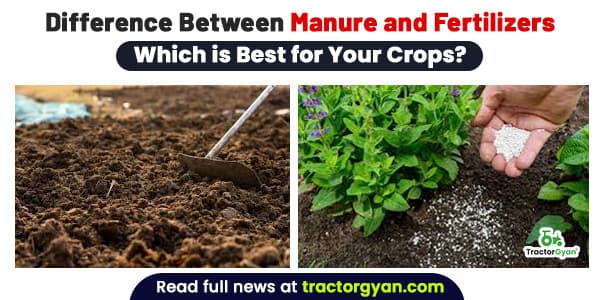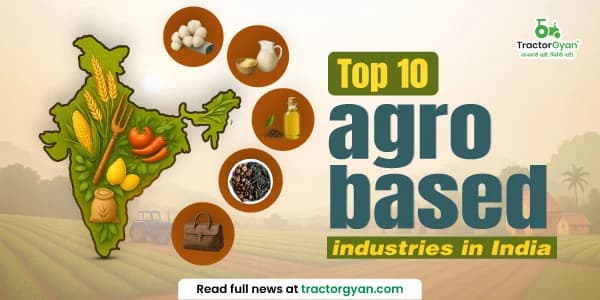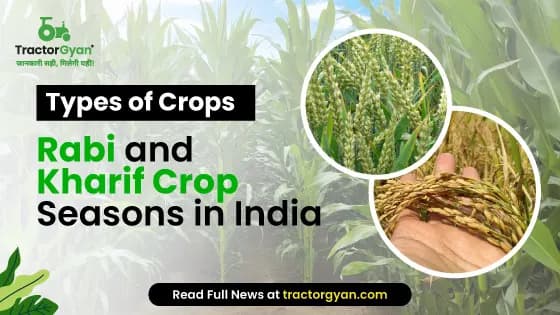Difference Between Manure and Fertilizers: Which is Best for Your Crops?
Indian farmers have been using manure as a natural way to make their land fertile, passing down its organic benefits from generation to generation. It changed after the Green Revolution when chemical fertilizers were introduced to increase crop yields.
This transition completely changed farming, making it more productive but also causing arguments about how it would affect the health and sustainability of the soil. Here, we will discuss the difference between manure and fertilizers, along with their benefits and types.
What is Manure: Its Composition and Benefits

Manure is made up of plant and animal waste. Indian farmers have been using it in their farms to make the soil fertile and to increase crop productivity. Manures usually have less nutrients (nitrogen, phosphate, and potassium) than chemical fertilizers.
Benefits of Manure
The key manure benefits for soil health include:
- Structure improvement: Organic manure helps hold soil particles together, which makes the soil more porous and better at holding water.
- Nutrient enrichment: Manure releases nutrients slowly over time, giving you a steady source of nutrients.
- Less polluting: Manure is chemical-free. As a result, it is safe for the environment and encourages sustainable agriculture.
- Increased fertility: Manure improves fertility by contributing organic substances to the soil.
Types of Manure
Different types of manure are available, and each one is good for the soil in its own way.
- Animal manure: It is obtained from cows, chickens, horses, and other animal waste. It is full of organic matter. It makes the land more fertile and increases the water-holding capacity of the soil.
- Green manure: It is made by plowing back green plants into the ground before they are fully grown. For better growth, It adds nitrogen and organic matter to the soil.
- Compost: It is made from dead leaves, kitchen waste, and veggie scraps. It is a natural soil booster that works slowly to enrich the soil with nutrients.
Manure is better than fertilizer because it can improve the structure of the soil and has less effect on the environment.
What is Fertilizer: Its Composition and Benefits

Fertilizer is a chemical substance primarily composed of nitrogen, potassium, and phosphorus. It is utilized to enhance soil fertility, hence supplying nutrients to crops. Farmers use fertilizers to enhance crop yield in a shorter duration.
Benefits of Fertilizers
- Immediate outcomes: Fertilizers rapidly provide plants with the essential nutrients they need.
- Customizable composition: They can be customized to meet the nutrient requirements of the soil.
- High nutrients: Fertilizers have higher nutrient concentrations than manure. It enhances crop growth efficiency in lesser time.
Despite these advantages, prolonged use of fertilizers may compromise soil health. When mixed with water, it can make water sources dirty and damage ecosystems. Fertilizers are often preferred by farmers because they help crops grow faster.
Types of Fertilizers
Fertilizers are of two types: natural fertilizers and chemical fertilizers.
- Natural fertilizers:
Products like bone meal, compost, and green soil are examples of natural fertilizers. They are better for the environment and help the land stay healthy over time.
- Chemical fertilizers:
These compounds mainly contain nitrogen, phosphorus, and potassium. Use them carefully to prevent environmental pollution.
Fertilizers can be classified according to the nutrients they contain. Some examples are:
- Nitrogen fertilizers: Plant growth regulators, especially for leaf development.
- Phosphorus fertilizers: Essential for the growth of flowers and roots.
- Potassium fertilizers: Good for plant health and make them resistant to diseases.
- Mixed fertilizers: These contain a variety of nutrients to give plants a complete supply.
Various crop varieties require distinct fertilizers for optimal growth. Fertilizers rich in nitrogen are ideal for green vegetables. Fertilizers with high phosphorus levels are good for root crops.
Why are Manure and Fertilizers Used in Fields?
Manure and fertilizers are both important for farming. Though there are many differences between manure and fertilizers, they serve the same purpose of nourishing soil.
Manure makes the soil more fertile over time without hurting the environment. Hence it is used a lot in organic farming. It helps the soil to hold on to water and nutrients better, which is important for growing better crops over the years.
But fertilizers are used because they add nutrients right away, which helps farms get better crops more quickly. It is very important in intensive farming methods, where the goal is to grow more crops in the shortest amount of time.
Difference Between Manure and Fertilizers
Let's explore the 9 difference between Manure and Fertilizer to understand how these are different from one other.
| Manure vs Fertilizer | ||
| Basis | Manure |
Fertilizer |
| Source | Organic - from animal and plant waste | Inorganic - manufactured using chemicals |
| Nutrients | Low in essential soil nutrients | High in soil nutrients like nitrogen, potash |
| Cost | Usually less expensive | Comparatively expensive |
| Environmental Impact | Ecofriendly improves soil structure and fertility over time | May degrade soil quality with continuous use |
| Effect on Health | Low risk to health | Can cause severe health issues due to chemical exposure |
| Absorption by Plants | Plants absorb it slowly | Plants absorb it quickly |
| Addition of Humus | Manure adds humus to the soil | Fertilizers do not add humus to the soil |
| Solubility in Water | Not soluble in water | Easily soluble in water |
| Examples | Cow dung, decayed leaves, etc | Urea, superphosphate, etc |
Fertilizer vs Manure: Conclusion

Manure and fertilizers are both good for crops, but which one is best for your crop depends on its needs. Manure improves the soil's structure and fertility over time, keeping it healthy. Fertilizers, on the other hand, add nutrients quickly, allowing farmers to see quick results.
A balanced approach that combines manure and fertilizers is often the best way to ensure long-term soil health and good productivity. We hope this article on the difference between manure and fertilizers is useful to you. Stay connected for more information!
Category
Read More Blogs
लोगों का खेती के प्रति बढ़ता हुआ रुझान और देश के अंदर लगातार चल रहे इंफ्रा पर ज़ोर के कारण ट्रैक्टर की बिक्री इस वर्ष शुरुआत से ही काफी अच्छी रही है। इस त्योहारी सीजन में भी ट्रैक्टर की बिक्री के आसमान...
जब भी हम किसी भी चीज में हैवी ड्यूटी की बात करते हैं तो सामान्यत: आपके दिमाग में कुछ भारी भरकम और मज़बूत जैसी चीज़ दिमाग में आती है। पर वाकई में हैवी ड्यूटी का मतलब क्या होता है, यह हम आज...
एक ट्रांसपेरेंट (पारदर्शी) और ट्रस्टेड (भरोसेमंद) कंपनी बनने के लिए सालों तक लोगों का विश्वास जीतना पड़ता है और ग्राहकों को बेहतर क्वालिटी गुणवत्ता युक्त उत्पाद उपलब्ध करवाना होता है। लेकिन ऐसा क्या ख़ास है सोनालीका में जो इसे भारत की सबसे ट्रांसपेरेंट...
Write Your Comment About Difference Between Manure and Fertilizers: Which is Best for Your Crops?
.webp&w=1920&q=75)
Top searching blogs about Tractors and Agriculture
07 Jan 2026
18 Dec 2025
29 Jul 2025
08 Sep 2025
03 Jul 2025
30 Jul 2025
30 Jul 2025
30 Jul 2025
29 Jul 2025
30 Jul 2025
09 Feb 2026
31 Jul 2025
18 Dec 2025
26 Dec 2025













.webp&w=2048&q=75)










.webp&w=2048&q=75)
.webp&w=2048&q=75)




























